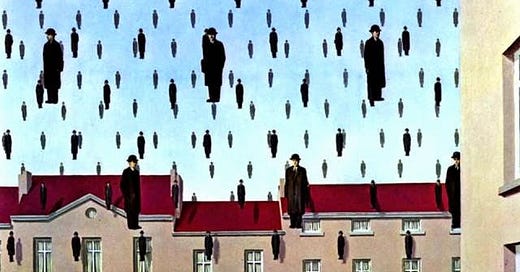Golconda, René Magritte, 1953
No time for a proper intro. Everything is getting shorter.
Pop songs: the average hit used to run 4+ minutes. Today it’s under 3 minutes. Songs now feature shorter intros, faster hooks, and front-loaded choruses. TikTok killed the bridge.
TV seasons: what used to be 20-25 episodes are now 6-10. It’s been called “the Great Contraction.” A show like Lost had 121 episodes over six seasons. Succession finished up in 2023 at 39 episodes over four seasons.
Books: so long, War and Peace. The average length of NYT bestsellers decreased by ~51 pages from 2011 to 2021.
Movies and Albums: oddly enough these are getting longer. But a look under the hood reveals that while runtimes and track lists have expanded, individual scenes and songs have been compressed.
Video Games: shorter play cycles now dominate the industry, with the rise of battle royales (like Fortnite) and roguelikes (like Balatro)
The News: story lengths have shortened and engagement has dropped: on average people spend around 55 seconds reading individual articles online.
Online Video: TikTok, Reels, and YouTube Shorts prioritize rapid engagement and short-form content.
Language: Character limits force thoughts into compact bites. We think and speak in slang (“sus,” “vibes”), acronyms (Lol, TL;DR) , emojis (😀), and gifs.
No doubt, algorithms and scrolling tech have changed how we think and behave. We flit between content like fruit flies.
The lazy reading is that this marks the no good, very bad demise of Western cultural civilization—a culture that once produced the long-flowing sentences of the Victorians, the sprawling symphonies of Mahler, the multi-volume novels of Proust, the epic films of David Lean, allowing attention to stretch, ideas to unfold, and meaning to accumulate over time.
But isn’t conciseness a virtue? Shouldn’t we get to the point?
Strunk & White put it best:
“When a sentence is made stronger, it usually becomes shorter. Thus, brevity is a by-product of vigor.”
Roy Peter Clark, author of How to Write Short, echoes their time-tested call for brevity and updates it for the modern age:
“We’re high on technology, but adrift in a jet stream of information. All the more reason to write short—and well.”
And the writer Donald Murray provides a useful clarification on what it means to strive for concision:
“Brevity comes from selection and not compression.”
Selecting the most salient ideas, and excluding everything else: this is good advice, whether you’re writing an email or directing a feature film. In theory, we cover more cognitive ground with bite-sized nuggets of information. And there are too many great examples of short-form brilliance to list here: poems, novellas, two-minute pop songs, one-minute comedy sketches. Brevity is an art form in itself.
And yet—
Something about our obsession with speed, shortness, and simplicity feels wrong. I think it reveals our anxiety about time: wasting it, spending it poorly, running out of it. We treat time as a resource, a currency to be managed. Metaphors We Live By has a great section on this, exploring how we “spend,” “save,” and “waste” time as though it’s money in a checking account.
Being time-obsessed makes sense if you’re running a company or a tech platform, where efficiency means profit. But it’s an exhausting way to live. Moments become transactional, conversations calculated. Some things simply take as long as they take. That’s not inefficiency; it’s living well.
The trick is knowing when to shorten and when to lengthen, when to slow down and when to speed up.
A few years ago I attended a driving school where Joe Schmoes like me get on a racetrack and zip around in fast cars. It was exhilarating— and intimidating. My first laps were a mess. I waffled between slamming on the accelerator and overcorrecting on the brake.
One of the best instructors, a compact man in his fifties named Nipper, pulled me aside. “Go fast where it’s easy to go fast,” he said. “Be methodical everywhere else.”
Sure enough, my lap times improved. I gained rhythm, tempo, a dash of confidence. I drove with a different sensibility. Fast-slow-fast-slow.
The late David Lynch often spoke of what he called “the art life.” He wasn’t overly concerned with whether a scene was long or short—he let it be what it needed to be. His excellent book Catching the Big Fish is filled with punchy aphorisms; he also directed sprawling, hypnotic films. The length of his projects served the vision, not the other way around.
David Lynch
The point isn’t to rush through things or to drag them out but to move at the right speed for the thing itself. To inhabit a way of living in and through the world that’s attuned to what’s good and true and artful.
So yes, seize the day—but at your own pace, and at whatever length makes sense.
Here’s Quest 13:
Shorten what should be short. Lengthen what deserves time.
Key Details
Find ways to shorten, condense, compress—without losing meaning
Change the way you e-mail. In this format, shorter is almost always better.
Murder your darlings, says the old piece of writing advice. Cutting mercilessly will strengthen your creative projects. Lengthen again after you’ve cut.
Avoid obvious waste: pointless meetings, meandering digressions, redundant details.
Drill into what truly matters—in school, business, your personal life. Focus on what actually moves the needle; once identified, expand from there.
Find ways to lengthen, expand, give depth—when the subject deserves it
Read full articles instead of skimming headlines. You’ll discover favorite journalists/writers reading this way, and you’ll be better informed.
Watch entire interviews instead of viral clips. The fuller context will inevitably sharpen or soften your opinion of the person being interviewed.
Burrow deep into a subject you find fascinating. Seek out multiple books on a topic, and work your way through them at your own pace.
Listen to longform podcasts. Some of my favorites include: Acquired, Hardcore History, The Explorers Podcast, and Revolutions.
Share some of your favorite “short” or “long” songs, books, TV series, movies, etc. in the comments below; I’ll respond with some picks of my own.
Complete this Quest and log it via the Quests submission form. I’ll highlight a few submissions in a future post.
And, as always, thanks for reading!






